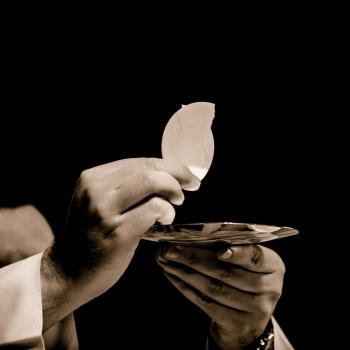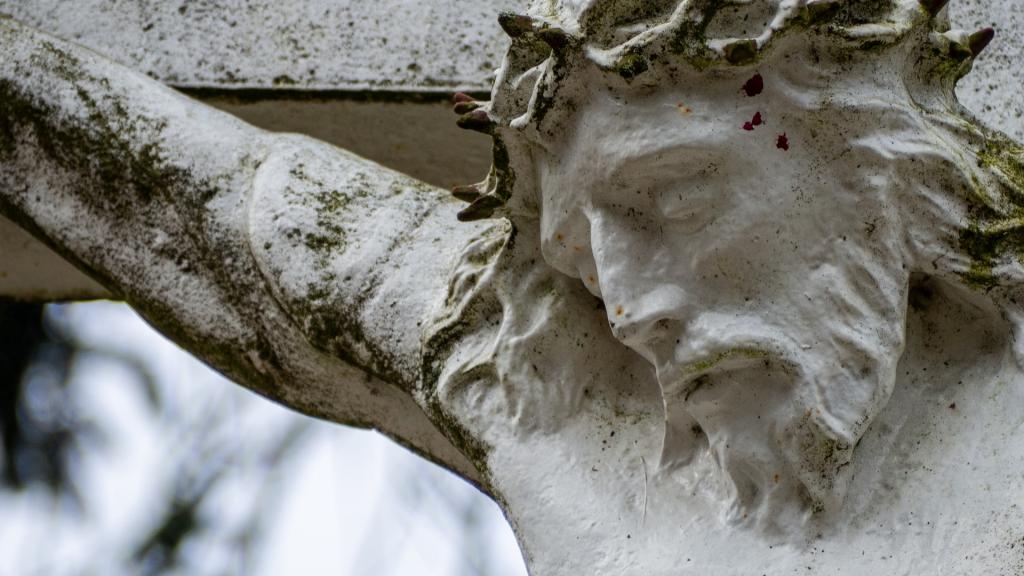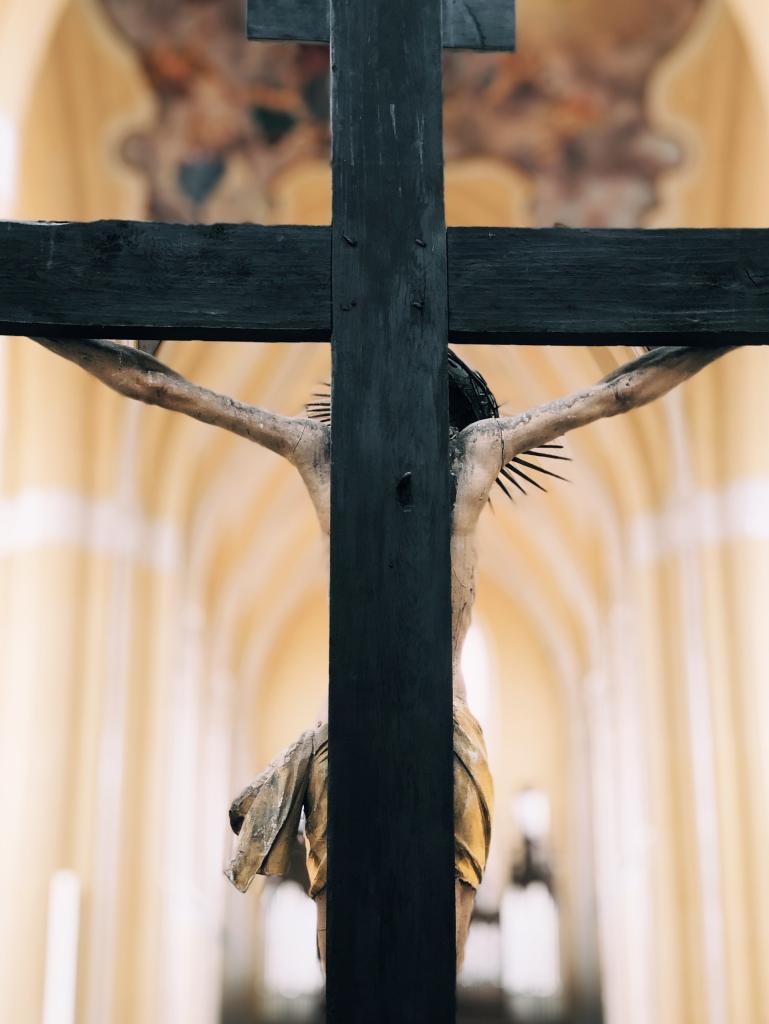The saying is sure and worthy of full acceptance, that Christ Jesus came into the world to save sinners– of whom I am the foremost. But for that very reason I received mercy, so that in me, as the foremost, Jesus Christ might display the utmost patience, making me an example to those who would come to believe in him for eternal life. (1 Timothy 1:12-17)
Living in the south again, Natalie and I are getting back in touch with southern customs and expressions. One of those I encountered recently is the phrase, “Hold my mule”.
Evidently, it borrows on the image of someone walking or ploughing with a mule, who asks someone nearby to hold the reins, so that they can attend to an emergency of some kind. Usually it has to do with confronting someone, either physically or verbally, as in:
SON: Mommy, my teacher called me a dummy.
MOM: Lawd! Somebody hold my mule!
In charismatic churches, “hold my mule” is apparently something that people also say when they are about offer a word of praise or get really excited about the Holy Spirit’s work in their lives. There is a story told of
an 86-year-old man named John [the Shouter], who joined an uptight, spiritually dead church.
From the moment John joined, his presence disturbed the whole congregation. He would come in every week singing, shouting, and dancing. As the sermon was being preached he would dance his way through the pews and around the sanctuary. Everyone raised their eyebrows in disapproval. For the sake of the congregation, the deacons tried to intervene. But John couldn’t be contained: when they held down John’s legs, his arms would flail out. When they held down his arms, his legs kicked out dancing.
After church one day those deacons talked amongst themselves: “Didn’t John know that we don’t act like that in our church? Didn’t John know that there are dignitaries and all sorts of important people in our church?” The deacons decided that something had to be done. So they drove out to John’s place in their fine cars – their BMWs and Saabs and whatnot.
As they pulled up to John’s ramshackle house, they found him out plowing a field behind an old, beat up mule. They walked out to talk to him. As they approached, John said to them, “I know why you’ve come out here, deacons. You’ve come out here to tell me that I shout and dance too much in church.”
One of the deacons replied, “That’s right, John. If you don’t stop shouting. If you don’t stop dancing. We’re going to have to put you out of our church.”
John said, “Well, then you’re going to have to put me out. Because I can’t hold my peace. Let me tell you why.”
“Look at all that land that you just drove over. God gave me all that land.”
“But you don’t want me to shout in your church.”
“Look at all my children. God gave me all my children. Not one time, have I been to the courthouse on their account. Not one time, have I been to the cemetery.”
“But you don’t want me to dance in your church.”
“Look at me,” he said. “I’m 86 years old. I’m still able to walk behind this old mule. I’m still able to harvest my own crops.”
“But you don’t want me to sing or shout or dance in your church.”
“Well, deacons, if you don’t want me to shout and dance in your church” – and this is where the song’s title comes from – “hold my mule, because I’m gonna sing and dance and shout and give thanks to God right here!”[i]
I think it is easy to read Paul, including his first letter to Timothy, and hear nothing but the references to sin. There are lots of reasons for this tendency: Some of it can be traced to our culture. We Americans find it easy to think in therapeutic terms but we resist the notion that there could be anything about us that requires confession, let alone repentance. So, just the mention of sin gets our attention and violates our sensibilities.
We are also predisposed toward a radical individualism that insists, “I do do what I want to do.” Conversations about sin clearly suggest that can be a problem and that there are things we do that can damage our relationship with God and with one another.
There are still other voices out there – among them, agnostics and atheists – whose first line of defense is the contention that religion is first and foremost about making you and I feel badly about ourselves. So, emphasizing sin to the exclusion of everything else – making it sound as if it is the whole of the Christian message – helps to make their argument, as misleading as it is.
By contrast, Paul comes back to this point: “I received mercy, so that in me, as the foremost, Jesus Christ might display the utmost patience, making me an example to those who would come to believe in him for eternal life.”
The mercy and patience of God – not the emphasis on sin – is Paul’s “hold my mule” moment. It is there that the emphasis of his message lands. The mercy and patience of God is the hopeful conviction that sustains him. And confidence in the merciful patience of God is why Paul’s life is lived out of gratitude.
However, one of the great challenges of the spiritual life is getting out of our own way, so that God can forgive, restore, and love us. There are many reasons that can be difficult, but three stand out:
One is that we don’t quite believe that God can love us.
When we sin – when we do something cruel, dishonest, unfair, or exploitative – most of us are burdened by the experience, even if we resist admitting it. A lot of us, I suspect, would be unwilling to forgive ourselves, if we were God. So, we struggle with being unlovable.
A good friend of mine who destroyed three marriages and left his children in the wake of his addiction, spent years trying to buy himself back into the good graces of his family and he didn’t bother going to church at all. But it was only when he finally surrendered to the love of God that he found peace and began to live out of love, rather than buy it from those around him.
Others of us, once we walk away from God, figure that if we have managed to get one part of the journey wrong, we may as well surrender the effort completely.
That can happen as a function of our personalities: A perfectionist will often take an “all or nothing” approach to the Christian life, operating on the assumption that if one part of life is marred by failure, then there is no reason to try at all.
For still others the driving force is an experience of one kind or another. Over the years, for example, I have seen people in spiritual direction, who were undeservingly shamed by a parent. Often that experience becomes defining for a child and – without reason, they think of themselves as “damaged goods”. They then embrace that shame making choices that give it a new and deeper hold on their lives, often manifesting itself in eating disorders and cutting.
And, of course, there always those of us who simply believe that God only wants to control us.
Blogging regularly about the Christian journey, I have lost track of the number of agnostics and atheists who go out of their way to tell me that the church is trying to control people and ruin their enjoyment of life. That is a lie.
While there might be brands of fundamentalism that coerce people and squeeze all the joy out of the Christian journey, most of us are not trying to do either one of those things. More to the point, most of us don’t believe that is what God intends or wants.
What we do believe is that God loves us more than we love ourselves, and that we are meant for glory. That cannot be forced, and God will not force us to accept that love. God will persist in pursuing us. God will warn us of the risks that we run, when we reject that love and give ourselves to motives that are heedless of God’s image in ourselves and others.
But God never coerces us. And the invitation to repentance and restoration is only intended to make that life of freedom and glory possible.
All three obstacles:
Our inability to believe that God can love us,
The despair that tempts us to believe that we may as well surrender the effort completely
And the belief that God only wants to control us and make us feel badly about ourselves
All three can keep us from finding that “hold my mule” moment of freedom, joy, and peace. So, opening ourselves to it requires reflection and prayer, an honesty with ourselves, and a willingness to ask, “What is holding me back?”
Once we do that and we name our own obstacle, the path forward is far easier. As Paul discovered, there is nothing God cannot forgive, no one that God does not love. And “in Christ” we discover what that love can do.
Once we have named the obstacle, then we can ask God to help us let those obstacles go. Be specific in your prayers:
If you feel unforgivable or unlovable, ask God:
“God, save me from the work of making myself forgiven and lovable. I’ve done damage to others that I cannot undo. Only in and by your great grace can wounds be healed, injury reversed.”
If you are trapped by shame, ask God:
“Jesus, release me from the shame that overwhelms me. The shame that others have projected onto my life, the shame I have brought to my life. Liberate me from its burden.”
If you have been led to believe that a closer relationship with God would simply be a path to a life of sterility:
“Gracious Lord, help me to step into the light of the path you open before me. Help me to see that your will for me is good and that only lies suggest otherwise.”
Let those prayers free you and lead you into the light. Then, once you are freed, ask God to alert you to what a life – your life – governed by that freedom and gratitude looks like. Some of what you experience may revolve around being freed from things that have kept you trapped: guilt, shame, secrecy, dishonesty, grief, anger, and cynicism are all things that take root in our lives when we have no place to go with our sins.
That life may also be marked by the freedom to do things you have been unable to do: Invest your life in friendships, experience the ability to be honest, discover the ability to love and the ability to let yourself be loved, and the ability to register simple joys.
As one of my friends put it: I have discovered the ability love and be loved. The freedom to tell others about the hope that is in me. And I have given up lying – which is good – because I was beginning to have trouble keeping track of the lies.
Let life in Christ draw you out of the narrow confines that can trap us. You may not sound or look like “Shoutin’ John”, but you will find peace, freedom, and the security that your life is held in the hands of the Lord of the Resurrection. And that is an occasion to say, “Hold my mule.”
[i] https://www.hillsidemedford.org/transforming-love/hold-my-mule/?gclid=Cj0KCQjw39uYBhCLARIsAD_SzMTSFwxE_n_Wh096hmPRhVkJlJkJVjG__tZSIUc07NAlHFDL94ILUY4aAvvbEALw_wcB
Photo by Tim Mossholder on Unsplash













